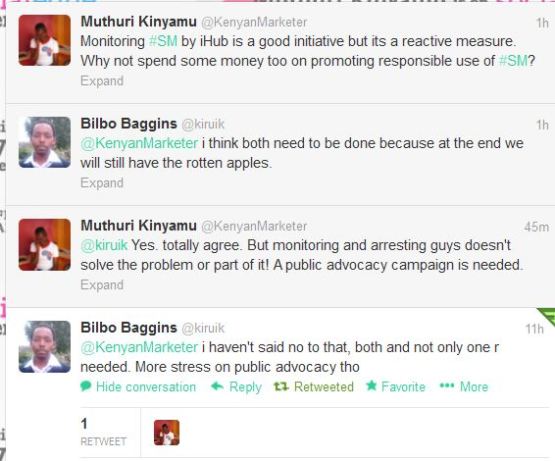On a chilly Thursday morning I woke up to something interesting on Twitter; a discussion fronted by @PaulaKahumbu CEO of Wildlife Direct. She posed a rather intriguing question and got me tweeting for the next one hour! Social media has changed and continues to shape the way we exchange of information, share content and add to it as well as pass it on and discuss ideas.
In the past we have seen #KOT (Kenyans on Twitter) come together for various good reasons, we had #CarpoolKE, #KOTagainstMpbonus, #PeremendeMovement, #KenyansForKenya, #KOT4Conje among other great initiatives meant for the good of the society.
We’ve also popular TT’s such as #TurkanaOil, #SomeoneTellCNN, #BudgetyaMasuffer, #MiddleClassProblemsKE and customer service oriented #tags; the popular #TwitterBigStick and #TwitterThumbsup. As some of us do well (right, good & social stuff) on social networks some tribalists have been publishing hate messages something DR. Bitange Ndemo has been talking about weekly since late last year in the Wednesday Media Monitoring briefings at the Infocomm Ministry.
Late last year we had #SGSNairobi by UNDP which brought together tech-preneurs & social innovators whose ideas, initiatives and campaign have had massive success and huge positive social impact and we should have more of such events often. (Methinks)
Recently (yesterday) we had #SomeoneTellBotswana, #SomeoneTellCNN & #SomeTellKenya which shows a growing sense of pride in our nation and demonstrates our patriotism. I am more than happy to see the number of hate pages and Twitter handles reduce in Kenya, we managed to pull through the election peacefully with minimal cases of hate tweets and propaganda. What this tells me is Kenyans are now taking social media seriously and it’s time we scaled that up to unlock the full potential on social media.
How about we have weekly sessions on Twitter on to discuss various issues/topics?
Karani Mutonga, CBI 360 and I started #BusinessWedKE; a 1 hour long discussion to share insights, opinions and information related to Biashara and various things affecting the industry sometime late last year but the hashtag didn’t gain traction. We used to invite online panelists to tweet and respond to some questions or give feedback on our topic of the week.
Due to the feedback on Dr. Paula Kahumbu’s #ThinkTank and #PowerHour we could dedicate an hour per week to discuss various topics/issues affecting us. Could be tech, politics, health, governance, corruption, education etc.
For purposes of having something relevant, the tech community can say come use #TechThinkTank, education players can use #EducationThinkTank na watu wa Biashara can have #BizThinkTank in our weekly #PowerHourKE. Or should they be uniform? Remain or use #KEThinkTank? You tell me!
So say this kicks off next week we can maybe start with education, the other week we go to governance or democracy like that et;al. I would also like to volunteer to coordinate the think tank debates/ chats, to come up with topics in partnership with players in different industries and raise them for discussion every Thursday 9 am to 10:00 am.
Well if you have any contribution to this post please follow me @KenyanMarketer & share your response with me and other #KOT.

